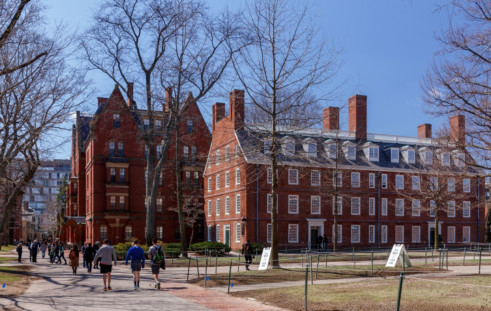
Ismail Ajjawi touched down at Boston Logan International Airport on Friday night, prepared to begin his freshman year at Harvard University. The 17-year-old Palestinian student never left the airport.
The Harvard Crimson reported that US officials detained Ajjawi for eight hours. After interrogating the minor and searching his phone and computer, they revoked his visa and sent him home to Lebanon.
Why?
According to a written statement by Ajjawi, an immigration officer claimed she “found people posting political points of view that oppose the US,” though she discovered nothing Ajjawi had posted himself.
“After the 5 hours ended, she called me into a room, and she started screaming at me. She said that she found people posting political points of view that oppose the US on my friend[s] list,” Ajjawi wrote, describing what happened after the officer searched his electronics. “I responded that I have no business with such posts and that I didn’t like, [s]hare or comment on them and told her that I shouldn’t be held responsible for what others post.”
Then, the Crimson reported, Ajjawi’s visa was revoked and he returned to Lebanon.
Michael McCarthy, a spokesman for US Customs and Border Protection, said the department is “responsible for ensuring the safety and admissibility of the goods and people entering the United States.
"Applicants must demonstrate they are admissible into the US by overcoming allgrounds of inadmissibility including health-related grounds, criminality, security reasons, public charge, labour certification, illegal entrants and immigration violations, documentation requirements, and miscellaneous grounds.
"This individual was deemed inadmissibleto the United States based on information discovered during the CBP inspection.”
A State Department official said in an email: “Visa records are confidential under US law; therefore, we cannot discuss the details of individual visa cases. Generally, visa applicants are continuously screened, both at the time of their application and afterwards, to ensure they remain eligible to travel to the United States.”
A Customs and Border Protection official said every applicant for admission to the United States is subject to complete inspection on arrival, and no one is allowed to enter until he or she has satisfied the examining officer of US citizenship or admissibility. In all cases, the applicant bears the burden of proof of admissibility, the official said.
The State Department has the authority to issue and revoke visas, the official said, and Customs and Border Protection has the authority to cancel visas under certain circumstances. If the agency determines an applicant is inadmissible for entry, Customs and Border Protection can cancel the visa.
A representative from Harvard did not immediately respond to questions from The Post, but spokesman Jonathan Swain told Crimson reporters that “university officials are currently working to resolve the matter before classes begin on Sept. 3.”
Ajjawi said that, initially, he was detained with a handful of international students. As the others were released, he was questioned about his religious practices and social media activity.
Despite Friday’s events, the Crimson reported that Ajjawi’s experience is “rare among Harvard undergraduates.” The school paper cited two Iranian graduate students — a scholar awarded a fellowship to study cardiovascular medicine and a scientist doing research on tuberculosis — who were blocked from entering the country in January 2017 because of the Trump administration’s travel ban on seven predominantly Muslim countries. Both students eventually entered the country to continue their work after weeks of negotiating with immigration officers.












